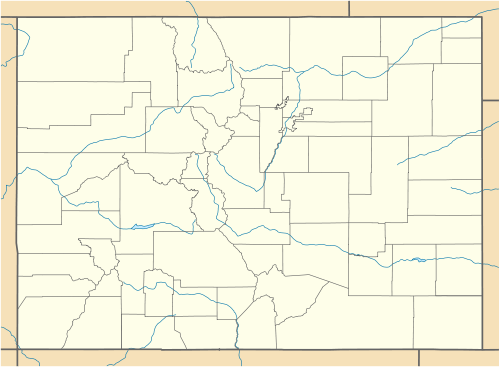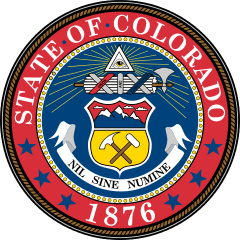Mount Bross
| Mount Bross | |
|---|---|
 | |
| Highest point | |
| Elevation | 14,178 ft (4,321 m) [1][2] |
| Prominence | 312 ft (95 m) [3] |
| Isolation | 0.99 mi (1.59 km) [3] |
| Parent peak | Mount Cameron[3] |
| Listing | Colorado Fourteener 22nd |
| Coordinates | 39°20′08″N 106°06′28″W / 39.335446°N 106.1077257°WCoordinates: 39°20′08″N 106°06′28″W / 39.335446°N 106.1077257°W [1] |
| Geography | |
 Mount Bross | |
| Location | Park County, Colorado, U.S.[4] |
| Parent range | Mosquito Range[3] |
| Topo map |
USGS 7.5' topographic map Alma, Colorado[1] |
| Climbing | |
| Easiest route | Hike |
Mount Bross is a high mountain summit in the Mosquito Range of the Rocky Mountains of North America. The 14,178-foot (4,321 m) fourteener is located in Pike National Forest, 4.1 miles (6.6 km) northwest by north (bearing 327°) of the Town of Alma in Park County, Colorado, United States.[1][2][3][4] Mount Bross is named in honor of William Bross, who owned property in the area.[5]
Geography
With a topographic prominence in the range of 292 to 332 feet (89 to 101 m), Mount Bross barely qualifies as an independent peak by the standard 300 foot prominence rule. It is often climbed together with Mount Lincoln and nearby Mount Democrat.[6]
On March 9, 1869, Daniel Plummer and Joseph Myers, both of Alma, Colorado, filed claim on the first silver mine on Mount Bross. They named their holding "The Dwight". The adjoining Moose Mine, which Plummer and Myers filed in 1871, became the most productive silver mine in Park County. A native of Pennsylvania, Myers later became a town trustee in Fairplay, the county seat of Park County.[7] The Dolly Varden Mine, discovered by George Brunk and Assyria "Cy" Hall in 1872, ranked second in silver production to the Moose Mine but outpaced the Moose in the richness of its ore. At the time the Dolly Varden opened, Hall was the sheriff of Park County.[7]
The pioneering American Presbyterian missionary, Sheldon Jackson, came there from Denver to preach the gospel to the miners. He later established missions in Alaska.[8]
In 2005, the summit of Mount Bross was closed to the public because of safety concerns related to mines and trail access through private land.[9] [10] [11]

See also
References
- 1 2 3 4 "MT BROSS ET". NGS data sheet. U.S. National Geodetic Survey. Retrieved October 20, 2014.
- 1 2 The elevation of Mount Bross includes an adjustment of +2.045 m (+6.71 ft) from NGVD 29 to NAVD 88.
- 1 2 3 4 5 "Mount Bross, Colorado". Peakbagger.com. Retrieved October 20, 2014.
- 1 2 "Mount Bross". Geographic Names Information System. United States Geological Survey. Retrieved October 29, 2014.
- ↑ Name History of Mount Bross - 14ers http://www.14ers.com/php14ers/historyview.php?parmpeak=Mt.%20Bross&parmcat=Name%20History
- ↑ Louis W. Dawson II (1994). Dawson's Guide to Colorado's Fourteeners, Volume 1. Blue Clover Press. ISBN 0-9628867-1-8.
- 1 2 Laura King Van Dusen, "Boom and Bust on Bross, When Silver Reigned, 1868-1893", Historic Tales from Park County: Parked in the Past (Charleston, South Carolina: The History Press, 2013), ISBN 978-1-62619-161-7, pr. 135-136.
- ↑ Laura King Van Dusen, "Sheldon Jackson's Fairplay Church: One of More than One Hundred in Western U.S.; Jackson Arrested, Jailed in Alaska; Contributed to Settlement of the West", Historic Tales from Park County: Parked in the Past, pp. 69-77.
- ↑ "Access Update -- Summer 2010". Colorado Fourteeners Initiative. Archived from the original on July 9, 2010. Retrieved 2013-09-03.
- ↑ Tillie Fong (2011-07-19). "Trails on Fourteeners may be opened". Rocky Mountain News. Retrieved 2008-06-28.
- ↑ Jim Hughes (2006-01-24). "Bill protecting fourteeners' landowners climbs in House". The Denver Post. Retrieved 2011-07-19.
External links
- Mount Bross on 14ers.com
- Mount Bross on Listsofjohn.com
- Mount Bross on Peakery.com
- Mount Bross on Summitpost
